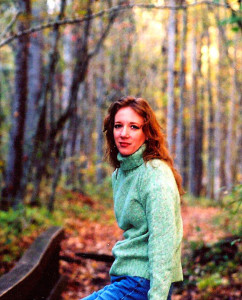 K.B. Ballentine teaches English and theatre arts to high school and college students when she’s not writing. She has attended writing academies in both America and Britain. Published in Bent Pin, MO: Writings from the River, Sequoia Review, River Poets Journal and Naugatuck River Review, she shares her work in various poetry groups. In 2006 she was a finalist for the Joy Harjo Poetry Award and in 2006 and 2007 was awarded prizes from the Dorothy Sargent Rosenberg Memorial Fund. KB has a B.A. and M.A. in Writing and a MFA in Creative Writing and Poetry. Readers can contact KB via her website: www.kbballentine.com.
K.B. Ballentine teaches English and theatre arts to high school and college students when she’s not writing. She has attended writing academies in both America and Britain. Published in Bent Pin, MO: Writings from the River, Sequoia Review, River Poets Journal and Naugatuck River Review, she shares her work in various poetry groups. In 2006 she was a finalist for the Joy Harjo Poetry Award and in 2006 and 2007 was awarded prizes from the Dorothy Sargent Rosenberg Memorial Fund. KB has a B.A. and M.A. in Writing and a MFA in Creative Writing and Poetry. Readers can contact KB via her website: www.kbballentine.com.
Author of:
Fragments of Light
KB Ballentine’s second collection of poems explores cycles, how light and shadow affect nature and people.
Gathering Stones
KB Ballentine’s stunning first collection of poems takes the reader on a journey of Ireland’s past through her turbulent history and into her promising future.
Reviews
“KB Ballentine sheds new light on old light. Her words of wisdom make your spirit come alive and travel the back roads of her mind where you encounter the seasons of her genius.”
–Margaret Britton Vaughn
Poet Laureate of Tennessee
“KB Ballentine’s poems display a painter’s sense of the ever-shifting, never-the-same light as it reveals, caresses, sometimes stuns. Light depicts both the outer natural world as well as the inner life of observer/speaker of these poems and exposes painful experiences as in the lines: “I’ve buried a sister, a friend. When was the family string cut—/who brought the knife?” And not to be missed are the seasons of the moon, surely some of the best poems in Fragments of Light.”
–Jeff Daniel Marion, Father
“It’s true that KB Ballentine is an admirably precise descriptive poet, loyal to the conditions of the natural world: “Leaves crunch underfoot/as I trek to the lake. Brief barks/from the other side, then silence.” But it’s a limited truth. Her imagination—inhering in verbs and nouns where it does its best work—invites nature “indoors,” into her subjective life: “The falcon’s body arced by whorls /of wind”; “summers were best, day-light yawned early, /stayed awake late”; and (among my favorites) “in the woods my boots bruise Johnny / jump-ups and forget-me-nots.” In the first case, “whorls” renders the invisible visible; in the second, personification animates, with friendly wit, a child’s delight in the lengthening days of summer; the third marshals even more subtle techniques: diction both literal and figurative, a provocative enjambment, and the power of the accurately named. Indeed, it’s the names of those flowers that suggest their resistance, or protest, against the bruising boots.
So, enjoy being “seduced by the light” of Ballentine’s keen observations, but also read these poems alert to their osmosis of the world into the self: “Breathe in, breathe out. Breathe,” she instructs. With understated grace, that’s what KB Ballentine’s poems do.”
–Steven Cramer
Goodbye to the Orchard
MFA Creative Writing Program Director, Lesley University